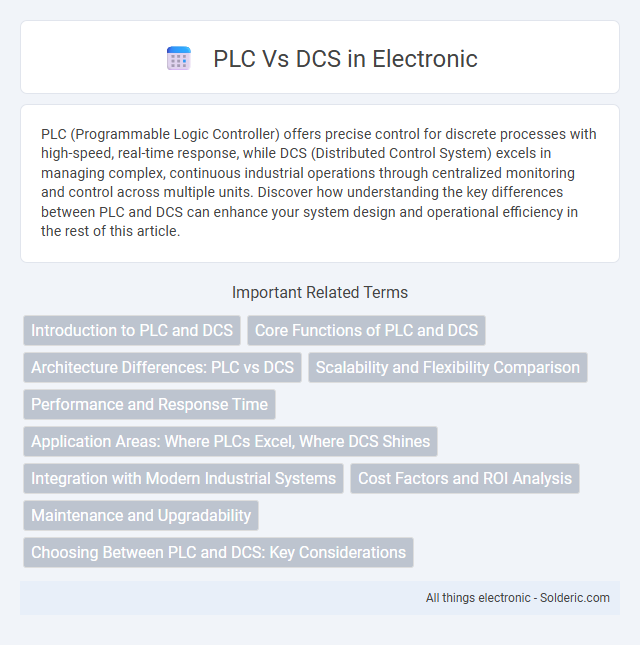PLC (Programmable Logic Controller) offers precise control for discrete processes with high-speed, real-time response, while DCS (Distributed Control System) excels in managing complex, continuous industrial operations through centralized monitoring and control across multiple units. Discover how understanding the key differences between PLC and DCS can enhance your system design and operational efficiency in the rest of this article.
Comparison Table
| Feature | PLC (Programmable Logic Controller) | DCS (Distributed Control System) |
|---|---|---|
| Purpose | Discrete control and automation of machinery | Continuous process control and complex industrial automation |
| Control Architecture | Centralized or modular control | Distributed control with multiple controllers |
| Scalability | Limited to small and medium systems | Highly scalable for large, complex processes |
| Programming Languages | Ladder Logic, Structured Text, Function Block | Function Block, Sequential Function Chart, Structured Text |
| Response Time | Fast, suited for real-time control | Moderate, optimized for process stability |
| Redundancy | Optional, less common | Built-in, essential for critical processes |
| System Cost | Lower initial investment | Higher initial cost, justified by complexity |
| Applications | Manufacturing lines, discrete production | Chemical plants, power generation, refining |
| Data Handling | Basic data logging and alarms | Advanced data acquisition, Historian integration |
Introduction to PLC and DCS
Programmable Logic Controllers (PLC) are compact digital computers used for automation of electromechanical processes, offering fast processing and flexibility in controlling machinery. Distributed Control Systems (DCS) consist of interconnected controllers managing complex industrial processes with a focus on reliability and centralized control. Understanding the distinctions between PLC and DCS helps optimize your system design based on scale, complexity, and control requirements.
Core Functions of PLC and DCS
Programmable Logic Controllers (PLCs) excel in real-time control and automation of discrete manufacturing processes, offering precise monitoring and rapid response capabilities for machinery operations. Distributed Control Systems (DCS) are designed for continuous process control in industries like oil refining and chemical production, integrating centralized monitoring with distributed control to enhance system reliability and scalability. Both systems incorporate robust communication protocols, but PLCs prioritize fast digital input/output handling, while DCS focus on complex analog signal processing and process management.
Architecture Differences: PLC vs DCS
PLC architecture centers around modular, compact units designed for discrete control tasks with direct I/O connections and fast response times, ideal for small to medium-sized automation processes. DCS architecture features a hierarchical, distributed system with multiple controllers connected via a robust communication network, supporting complex process control and seamless integration across large-scale industrial plants. Your choice between PLC and DCS architecture depends on the scale, complexity, and need for centralized control in your automation project.
Scalability and Flexibility Comparison
PLC systems offer high scalability with modular components that can easily be expanded or reconfigured to meet changing process demands, making them ideal for small to medium-sized applications. DCS platforms provide superior flexibility for complex, large-scale operations by integrating multiple control loops and systems into a centralized architecture with advanced process management capabilities. Your choice between PLC and DCS depends on the required scalability for future growth and the flexibility needed to handle intricate control strategies.
Performance and Response Time
PLC systems excel in fast response times, often delivering real-time control within milliseconds, making them ideal for high-speed automation tasks. DCS platforms, while slightly slower, provide robust performance with distributed control and high reliability suited for complex industrial processes. Your choice depends on the need for rapid execution versus integrated system-wide control and scalability.
Application Areas: Where PLCs Excel, Where DCS Shines
PLCs excel in discrete manufacturing environments, such as automotive assembly lines, packaging, and material handling, where fast, real-time control and flexibility are critical. DCS systems shine in continuous, process-oriented industries like chemical plants, oil refineries, and power generation, offering superior process control, integration, and scalability for complex, large-scale operations. The choice depends on factors like process complexity, control granularity, and system scalability requirements.
Integration with Modern Industrial Systems
PLCs seamlessly integrate with modern industrial systems through robust communication protocols like Ethernet/IP, Modbus TCP, and OPC UA, enabling real-time data exchange and flexible automation across diverse machinery. DCS platforms excel in integrating complex, large-scale process control with advanced analytics, leveraging centralized control and unified human-machine interfaces (HMIs) to optimize plant-wide operations. Both systems support Industry 4.0 initiatives by facilitating interoperability with IoT devices and cloud-based monitoring solutions, enhancing overall operational efficiency and decision-making.
Cost Factors and ROI Analysis
PLC systems generally offer lower initial costs and simplified scalability, making them cost-effective for small to medium-sized automation projects. DCS solutions involve higher upfront investments due to integrated hardware and software but deliver superior long-term ROI through enhanced process control, reliability, and reduced downtime in large-scale applications. Your choice should consider project complexity, scale, and the balance between upfront expenditure and operational savings to maximize overall return on investment.
Maintenance and Upgradability
PLC systems offer easier and more cost-effective maintenance with modular components that can be quickly replaced or upgraded, minimizing downtime. DCS platforms provide centralized control with complex integration, which can require specialized expertise and longer maintenance periods but support extensive scalability and advanced diagnostics. Your choice depends on whether you prioritize straightforward maintenance and flexible upgrades (PLC) or comprehensive process control with scalable enhancements (DCS).
Choosing Between PLC and DCS: Key Considerations
Selecting between PLC (Programmable Logic Controller) and DCS (Distributed Control System) hinges on factors such as system complexity, scalability, and control architecture. PLCs excel in discrete manufacturing and fast, straightforward process control, offering modularity and ease of programming, whereas DCS provides integrated, centralized control ideal for continuous, large-scale industrial processes requiring high reliability and advanced data management. Evaluating application size, real-time control needs, and integration capabilities ensures optimal alignment with operational goals and maintenance resources.
PLC vs DCS Infographic

 solderic.com
solderic.com